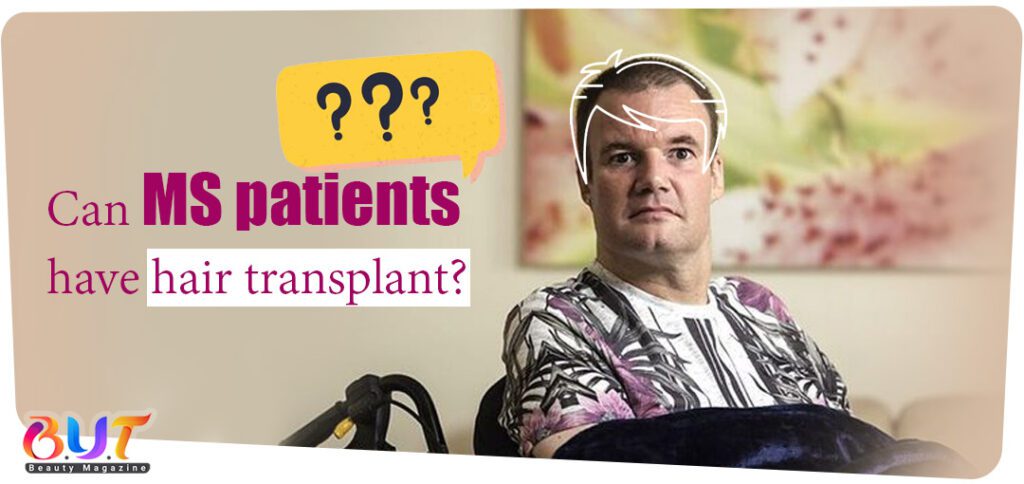Can MS patients have hair transplant?

Hair loss is a completely natural phenomenon. You may not realize it, but you lose about 50 to 100 hairs every day. Most specialists do not recommend any specific treatment for normal hair loss. Modifying lifestyle, changing diet and increasing water consumption are effective in reducing hair loss.
Only in cases where hair loss is out of control, it is necessary to see a doctor and get treatment. It is possible that MS, which is an autoimmune disease, indirectly contributes to hair loss. People with this disease are involved with certain symptoms, but hair loss cannot be included in the main symptoms of this disease.
Due to heredity or side effects of taking some drugs, these patients may face severe hair loss. The main question is, is hair transplant possible for MS patients? If this question bothers you, stay with us until the end.
Hair transplant for MS patients
If you are suffering from this disease, you must have searched many sites to find right way of hair transplant. Acquiring sufficient information is essential in achieving desired result. Before anything, you should know that knowing the main reason for hair loss is very important in choosing right method and treating it.
Because in some cases, the surgeon does not allow hair transplant for MS patients. The type of MS and its severity should be determined. Drug interactions can cause irreversible complications during and after operation. This is the main reason for surgeon sensitivity to diagnose severity of MS disease.
Types of MS
MS disease has two periods, and doctor uses special drugs to treat the problems in each period. This has caused surgeon to prescribe different drugs for hair transplantation or to prevent hair loss. Familiarity with type of disease is important in choosing the implantation method. Types of MS include:
Secondary progressive disease: Most people with this disease experience periods with new symptoms. There is a possibility of complete or partial recovery of these patients. To prevent drug interactions, it is recommended that these patients undergo hair transplantation after completing treatment period. There may be an interaction between the drugs a person takes to treat MS and the pain relievers from hair transplant.
Primary progressive disease: Some patients with MS are faced with gradual onset of disease and permanent progression of its symptoms. These patients experience no recurrence of symptoms. Different treatments are used to cure attacks and manage symptoms in different patients. The symptoms caused by this disease are different in different people, because occurrence and type of symptoms depend on the location of damaged nerve fibers. If doctor manages to control disease symptoms, the surgeon will give permission for hair transplant.
Suitable method of hair transplantation for MS patients
MS is an autoimmune disease whose main cause is still unknown. The conducted investigations consider a set of hereditary and environmental factors to be effective in occurrence of MS. Taking drugs to control MS attacks in some cases causes hair loss to worsen.
Other factors such as vitamin D deficiency and severe stress are also effective in hair loss in these patients. The advancement of implantation techniques and use of new equipment and technologies have provided the possibility of hair transplantation for these people. After examining attacks and physical conditions of a large number of patients with multiple sclerosis or MS, researchers and surgeons have come to conclusion that non-surgical methods of hair transplantation are the best solution for these patients.
In general, it is not possible to choose one of hair transplant methods as the best solution, because each of these methods has a set of advantages and disadvantages that can be chosen after careful examination. The amount of hair loss and desired hair density of applicant are two main factors in choosing the best implantation method.
Advantages of micrograft implantation
This method has a very short recovery period. The applicant will not have any restrictions to perform work and sports activities. You will not feel any pain or discomfort after implantation. There are no scars, incisions or sutures in donor area. This technique is considered the best option for extracting very thin grafts.
People who have a relatively stiff scalp should prioritize using micrograft method. The risk of harvesting unstable hair is minimized in this method. The number of extracted follicles is very high and each extracted follicle is very high quality.
No damage is done to grafts during extraction process. With help of this technique, we will not face problem of follicles falling into deep parts of skin. There is no limit to the number of follicles harvested per session.
Not leaving scars is a great option for patients who cut their hair. On the other hand, people who have a history of keloid scars or creation of extra flesh at wound site should use micrograft method for hair transplantation. The wounds created in this method are very small and heal quickly.
Disadvantages of micrograft method
Choosing a reputable clinic and performing hair transplantation by an experienced surgeon is effective in reducing possible complications and disadvantages of this method. But this surgery also has weaknesses like any other method. This operation may be done in two days, but keep in mind that prolonging the treatment process will cause suffer to patient.
The number of follicles extracted in micrograft method is less compared to traditional methods. This is one of this method disadvantages. But due to limited baldness in patients with MS, the small number of extracted follicles does not cause any problems for surgeon and patient.
Complications of hair transplant
Some patients with MS avoid hair transplantation due to concern of possible complications, but you should know that choosing an inappropriate method for implantation, the lack of compatibility of transplanted follicles and implantation method with patient's physiological conditions, and inexperience of surgical staff play a key role in increasing the incidence of postoperative complications.
The important thing is that the intensity and duration of these symptoms varies in different people. Adherence to care after hair transplantation plays a significant role in reducing recovery period and faster recovery of these complications. Complications of hair transplantation in people with MS include:
Scalp numbness: In some cases, the nerves may be damaged during follicles extraction. If injury is not serious, the numbness will disappear after a short time. If a non-surgical method is used to harvest the graft, the probability of this problem will be zero.
Pain: One of normal and natural side effects after hair transplant is pain. You usually face this pain as soon as the effect of anesthetic drugs wears off. This complication is short-term and resolves after about 3 to 7 days. Painkillers can be used to relieve these pains.
Subcutaneous cyst: One of natural complications of hair transplantation is formation of small purple cysts. These cysts are painless and disappear after a short time.
Severe itching: itching is body's natural reaction to repair and heal wounds. In this surgery, the person experiences severe itching, which indicates recovery. Try to never scratch your head, as this will only exacerbate the shedding of transplanted follicles.
Bleeding: One of main problems faced by smokers or alcoholics is increased bleeding after hair transplant. If bleeding is not severe, you can cover it with sterile gauze.
Swelling: One of natural side effects after hair transplantation is swelling at transplant site. This problem may continue for 5 days after hair transplant. Taking the medicines prescribed by doctor is effective in solving this problem.
Infection: Infection occurs in rare cases and is a relatively painful complication. Most beauticians who fail to take prescription drugs on time suffer from this condition. If infection does not continue, taking antibiotics is enough to treat it. But if the symptoms worsen, be sure to see your doctor.
If you experience symptoms such as fever, discharge of pus, discoloration of transplant site, prolonged swelling, burning, and heavy bleeding, consult a doctor as soon as possible.
Care tips after hair transplant
As we said, following the care instructions before and after operation has a key role in reducing recovery period and speeding up recovery. It is more important to pay attention to these points in patients with MS. Because failure to comply with these conditions will cause serious damage to transplanted follicles and aggravate symptoms of MS. Care instructions after hair transplant in MS patients include the following:
- It is better to wash your hair twice a day 4 days after operation according to doctor's instructions.
- To reduce swelling after implantation, sleep in a semi-sitting position and place your head higher than other parts of body.
- Transplanted follicles should not be in direct contact with sunlight for about 6 months. Don't forget to wear a brimmed hat.
- Take medicines on time and as prescribed by doctor.
- Include fruits, fresh vegetables, chicken, dairy products, eggs and fish in your diet.
- Avoid lifting heavy objects.
- Postpone any activity that puts a lot of pressure on head until you recover.
- Postpone swimming in public pools, aerobic exercise, and hot baths until you are sure the hair follicles are stabilized.
FAQ about hair transplant in MS patients
How long does hair transplant for MS patients take?
The duration of operation is different in different patients and depends on factors such as amount of baldness, the desired hair density and the method of extracting follicles. But in general, this operation is done between 6 and 8 hours. In some cases, the doctor may extract follicles and implant them within two days.
What are the effective factors in reducing hair transplant complications in MS patients?
The type of implantation method, the level of surgeon skill and experience, the sterility of operating room equipment and skill of medical staff are effective in reducing possible complications of this operation.













